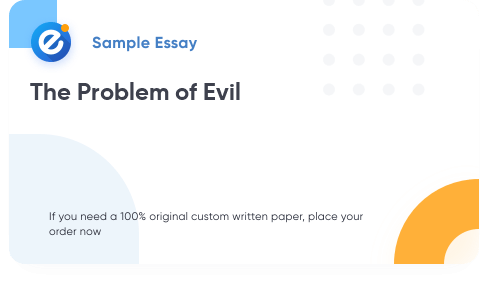
As old as the world is, people have been engaging in the arguments of the existence of God. God has been given so many attributes by the theists. He has been referred to as benevolent, merciful, omniscience, omnipresent, omnipotent among other positive terms. The practical life on the ground portrays a picture that is truly bizarre. The world is chaotic, full of diseases, very wicked, very dangerous, and unfriendly. These negative realities are happening in the full presence of God-a God who has what it takes to provide the best for his children. However, there is a God who has chosen to give a blind eye and a deaf ear to his own suffering creation. Here, the problem of evil arises. It is arguably how a person can reconcile good attributes of such a God with a world full of wickedness and evil[1].
Theists have formulated various theories and arguments with the aim defend their stand, and also as an attempt to explain the complexity of the subject. Despite all these theories, the true still holds that God is in existence. The foremost theory is their illustrious leaning towards free will[2]. Free will proponents believe that God is too good because after creating human beings, he gave them freedom to do what they desired most. In addition, he gave them the ability to choose between good and evil. Some human acts would be in congruent with the will of god; they would lead to praise and rewards from god. On the other hand, some human acts would be against the will of God; they would lead to blame and punishment from God. This means that when people choose to do contrary to the will of God, they have to suffer the consequences of their own actions. Theists still believe that the people who engage in dishonest acts have the opportunity to reconsider their actions and choose rightly thereby attracting benefits from God. To them, evil is as a result of man’s own willed irrationality. They further argue that existence of evil should not be used to discredit the possibility of an all-powerful, loving and merciful God among other attributes[3].
Calculate the cost of essay
This idea of free will has in most cases been used also to show how God develops and nurtures character and personality. For one to become the best possible person in the universe, theists believe, one must undergo testing moments[4]. There is happiness in overcoming these necessary hardships.
This theory is acutely much convincing or rather it appears to be. Those who suffer silently without complaining leap exceptional benefits. Those who quit lose a fantastic opportunity of improving and perfecting oneself. Nevertheless, all is not well when people continue to suffer calamities such as drought, earthquakes, tsunamis lightning attacks and floods, for example, all which are beyond the faculty of freewill. How does a God who is all knowing refuse to alert His own creation of a looming disaster long before it happens? If He cannot alert them, why can’t he prevent earthquakes from destructing humanity when he is extremely powerful and capable of arresting the seismic shocks?[5]
Well, it may be true that God is extraordinarily powerful, and all knowing but still act as if He would not capable- either because of laziness or other factors. What is highly contradictory is the attribute of being Omni- benevolent. How can one just opt to watch from a distance as those whom he claims to unconditionally in love with them perish when he has the solution? This perhaps should lead us to radical conclusions.
Limited Time
special offer
In a world where a God who is all powerful, all knowing, all loving and all present is valid, should be free from vices and sufferings. In the event that suffering persists, then trust in such a God will be irrational and the problem of evil will continue to be of concern.

